Anton Emelyanov
Multimodal Evaluation of Russian-language Architectures
Nov 19, 2025Abstract:Multimodal large language models (MLLMs) are currently at the center of research attention, showing rapid progress in scale and capabilities, yet their intelligence, limitations, and risks remain insufficiently understood. To address these issues, particularly in the context of the Russian language, where no multimodal benchmarks currently exist, we introduce Mera Multi, an open multimodal evaluation framework for Russian-spoken architectures. The benchmark is instruction-based and encompasses default text, image, audio, and video modalities, comprising 18 newly constructed evaluation tasks for both general-purpose models and modality-specific architectures (image-to-text, video-to-text, and audio-to-text). Our contributions include: (i) a universal taxonomy of multimodal abilities; (ii) 18 datasets created entirely from scratch with attention to Russian cultural and linguistic specificity, unified prompts, and metrics; (iii) baseline results for both closed-source and open-source models; (iv) a methodology for preventing benchmark leakage, including watermarking and licenses for private sets. While our current focus is on Russian, the proposed benchmark provides a replicable methodology for constructing multimodal benchmarks in typologically diverse languages, particularly within the Slavic language family.
MERA Code: A Unified Framework for Evaluating Code Generation Across Tasks
Jul 16, 2025Abstract:Advancements in LLMs have enhanced task automation in software engineering; however, current evaluations primarily focus on natural language tasks, overlooking code quality. Most benchmarks prioritize high-level reasoning over executable code and real-world performance, leaving gaps in understanding true capabilities and risks associated with these models in production. To address this issue, we propose MERA Code, a new addition to the MERA benchmark family, specifically focused on evaluating code for the latest code generation LLMs in Russian. This benchmark includes 11 evaluation tasks that span 8 programming languages. Our proposed evaluation methodology features a taxonomy that outlines the practical coding skills necessary for models to complete these tasks. The benchmark comprises an open-source codebase for users to conduct MERA assessments, a scoring system compatible with various programming environments, and a platform featuring a leaderboard and submission system. We evaluate open LLMs and frontier API models, analyzing their limitations in terms of practical coding tasks in non-English languages. We are publicly releasing MERA to guide future research, anticipate groundbreaking features in model development, and standardize evaluation procedures.
MERA: A Comprehensive LLM Evaluation in Russian
Jan 12, 2024



Abstract:Over the past few years, one of the most notable advancements in AI research has been in foundation models (FMs), headlined by the rise of language models (LMs). As the models' size increases, LMs demonstrate enhancements in measurable aspects and the development of new qualitative features. However, despite researchers' attention and the rapid growth in LM application, the capabilities, limitations, and associated risks still need to be better understood. To address these issues, we introduce an open Multimodal Evaluation of Russian-language Architectures (MERA), a new instruction benchmark for evaluating foundation models oriented towards the Russian language. The benchmark encompasses 21 evaluation tasks for generative models in 11 skill domains and is designed as a black-box test to ensure the exclusion of data leakage. The paper introduces a methodology to evaluate FMs and LMs in zero- and few-shot fixed instruction settings that can be extended to other modalities. We propose an evaluation methodology, an open-source code base for the MERA assessment, and a leaderboard with a submission system. We evaluate open LMs as baselines and find that they are still far behind the human level. We publicly release MERA to guide forthcoming research, anticipate groundbreaking model features, standardize the evaluation procedure, and address potential societal drawbacks.
RuCLIP -- new models and experiments: a technical report
Feb 22, 2022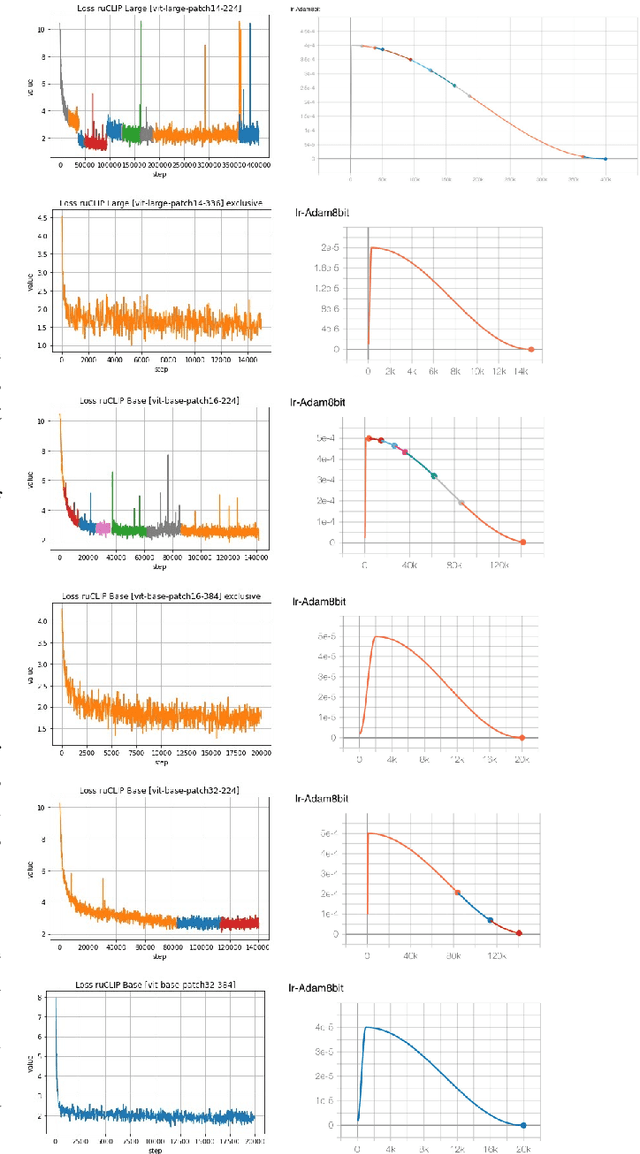
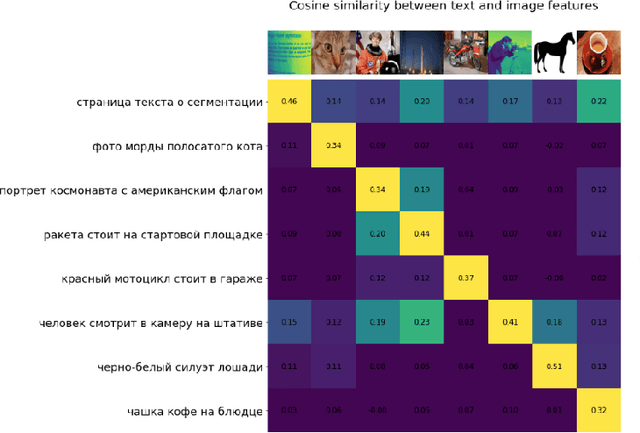
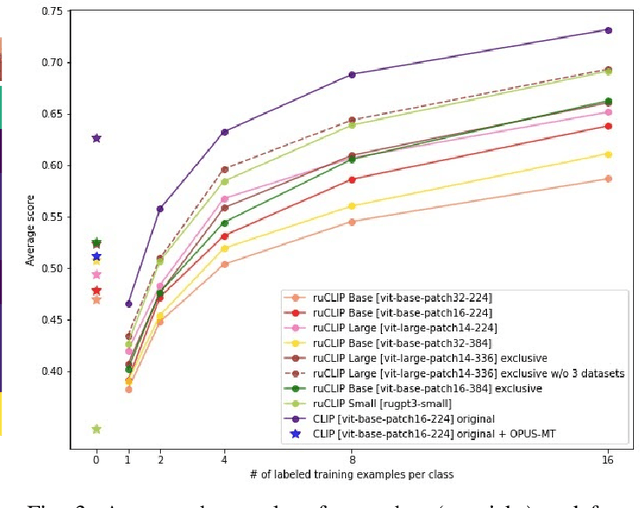
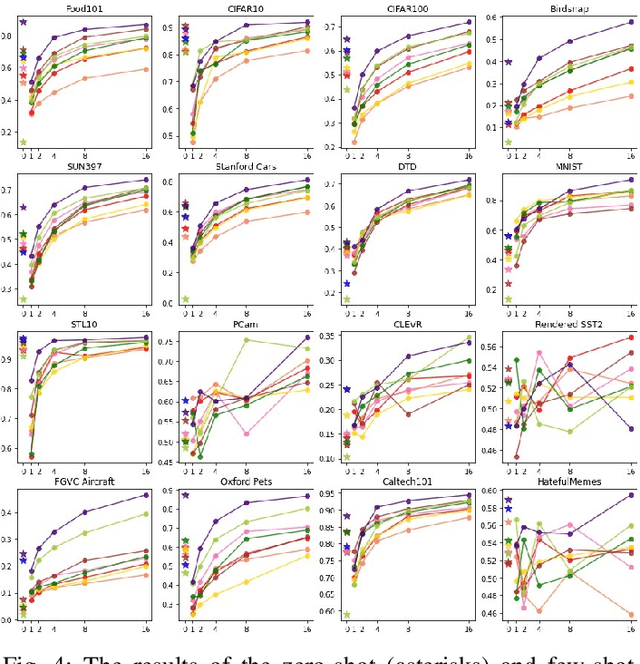
Abstract:In the report we propose six new implementations of ruCLIP model trained on our 240M pairs. The accuracy results are compared with original CLIP model with Ru-En translation (OPUS-MT) on 16 datasets from different domains. Our best implementations outperform CLIP + OPUS-MT solution on most of the datasets in few-show and zero-shot tasks. In the report we briefly describe the implementations and concentrate on the conducted experiments. Inference execution time comparison is also presented in the report.
Russian SuperGLUE 1.1: Revising the Lessons not Learned by Russian NLP models
Feb 15, 2022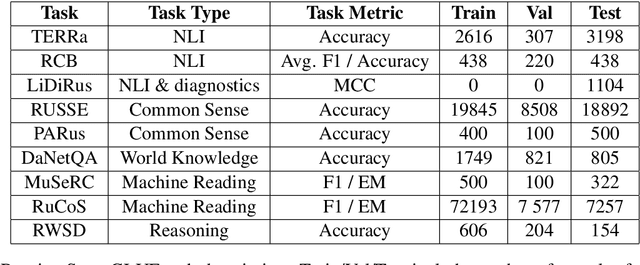
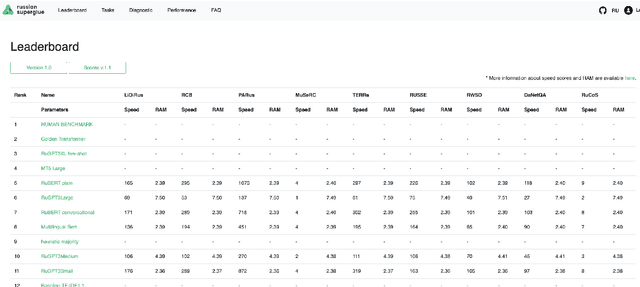
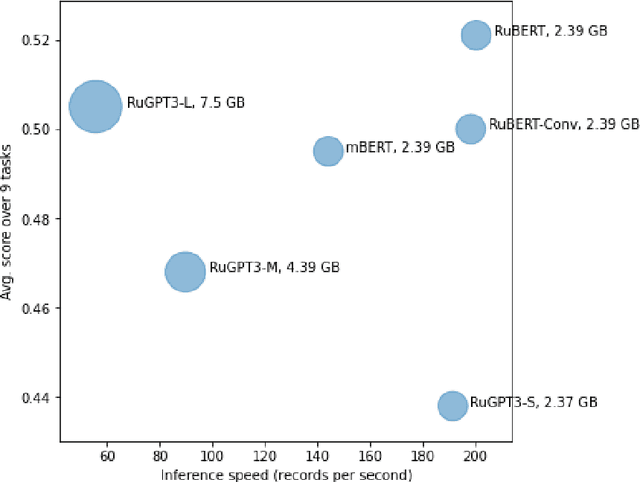
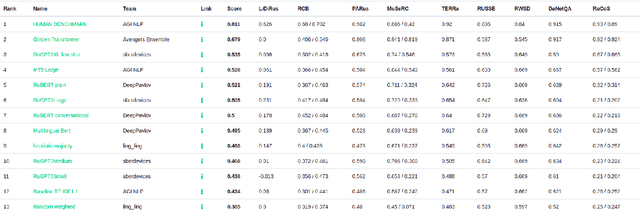
Abstract:In the last year, new neural architectures and multilingual pre-trained models have been released for Russian, which led to performance evaluation problems across a range of language understanding tasks. This paper presents Russian SuperGLUE 1.1, an updated benchmark styled after GLUE for Russian NLP models. The new version includes a number of technical, user experience and methodological improvements, including fixes of the benchmark vulnerabilities unresolved in the previous version: novel and improved tests for understanding the meaning of a word in context (RUSSE) along with reading comprehension and common sense reasoning (DaNetQA, RuCoS, MuSeRC). Together with the release of the updated datasets, we improve the benchmark toolkit based on \texttt{jiant} framework for consistent training and evaluation of NLP-models of various architectures which now supports the most recent models for Russian. Finally, we provide the integration of Russian SuperGLUE with a framework for industrial evaluation of the open-source models, MOROCCO (MOdel ResOurCe COmparison), in which the models are evaluated according to the weighted average metric over all tasks, the inference speed, and the occupied amount of RAM. Russian SuperGLUE is publicly available at https://russiansuperglue.com/.
RussianSuperGLUE: A Russian Language Understanding Evaluation Benchmark
Nov 02, 2020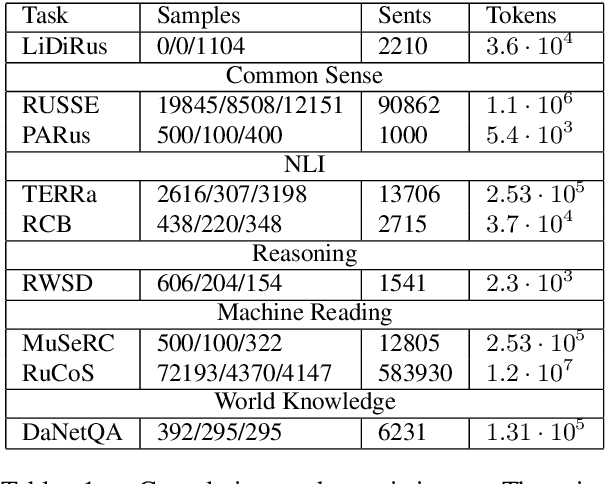
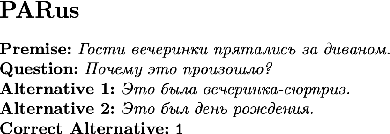
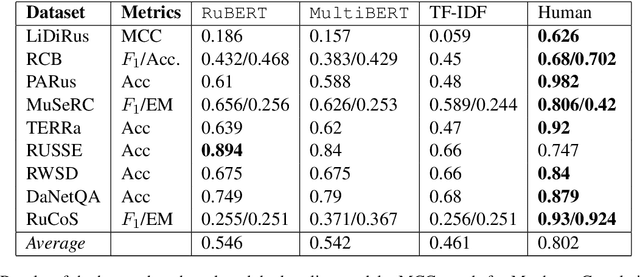

Abstract:In this paper, we introduce an advanced Russian general language understanding evaluation benchmark -- RussianGLUE. Recent advances in the field of universal language models and transformers require the development of a methodology for their broad diagnostics and testing for general intellectual skills - detection of natural language inference, commonsense reasoning, ability to perform simple logical operations regardless of text subject or lexicon. For the first time, a benchmark of nine tasks, collected and organized analogically to the SuperGLUE methodology, was developed from scratch for the Russian language. We provide baselines, human level evaluation, an open-source framework for evaluating models (https://github.com/RussianNLP/RussianSuperGLUE), and an overall leaderboard of transformer models for the Russian language. Besides, we present the first results of comparing multilingual models in the adapted diagnostic test set and offer the first steps to further expanding or assessing state-of-the-art models independently of language.
 Add to Chrome
Add to Chrome Add to Firefox
Add to Firefox Add to Edge
Add to Edge